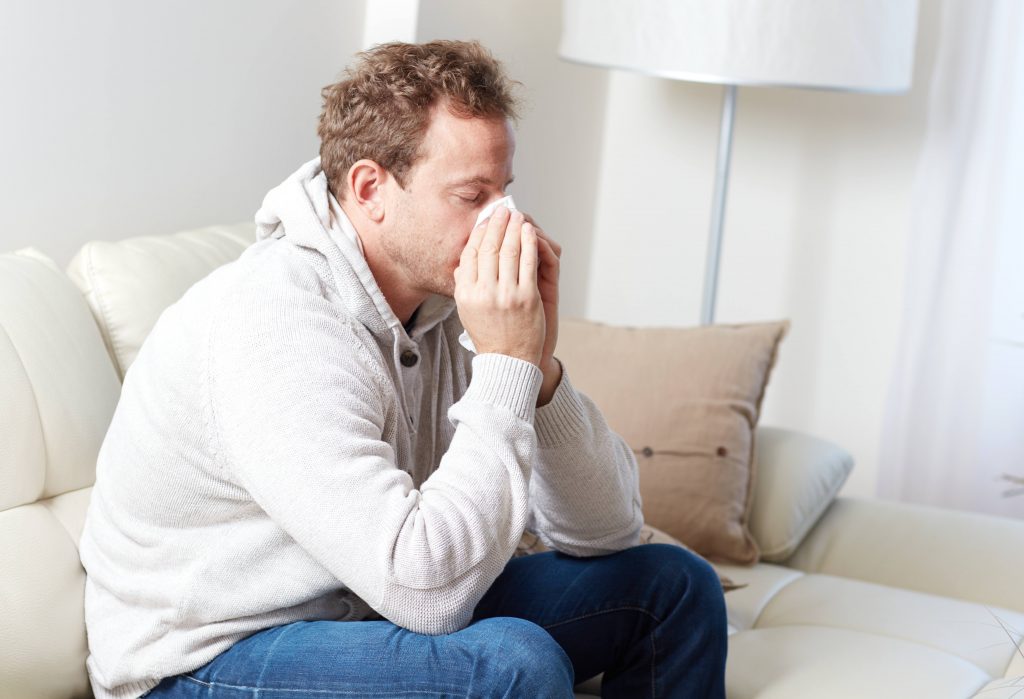-
Mayo Clinic Q and A: Is it allergies or a sinus infection?

DEAR MAYO CLINIC: I have had allergies since childhood, suffering during both the spring and fall seasons. This past month, however, I am experiencing more congestion and mucus, and I even have some facial pain. I’m beginning to wonder if my symptoms are really from allergies or if they may be caused by a sinus infection instead. How can I tell the difference?
ANSWER: Allergies and sinus infections often are mistaken for one another. But they are two separate conditions. By paying close attention to the specific symptoms you have, you can usually identify which one is more likely to be causing the problem.
When someone has allergies, it means their body is negatively reacting to allergens, such as pollen, dust mites or pet dander. This reaction happens when the immune system releases certain substances, such as histamine, into the bloodstream. This leads to allergy symptoms, which may include itching, sneezing, sinus pressure, nasal congestion and discharge. Although allergies can produce many of the same symptoms as a sinus infection, the condition is different.
A sinus infection, also called sinusitis, affects the cavities around your nasal passages. The infection causes your sinuses to become inflamed and swollen. The swelling makes it hard for your sinuses to drain, and mucus builds up. You become congested and have trouble breathing through your nose. Sinusitis often causes thick nasal discharge. In addition, you may experience headaches as well as pressure around your eyes, cheeks, nose or forehead. Though more uncommon, cough and a sore throat can accompany sinusitis, too.
One of the telltale signs to discern if you have allergic rhinitis or a sinus infection is if you have itchy, watery eyes along with other symptoms. Itchiness is rarely a symptom of a sinus infection. Contrary to popular belief, the color of your mucus does not help tell the difference between allergies or sinus infections.
Given that you have noted seasonal allergies, pay attention to the timing of your symptoms. This also may help decide if they likely are caused by allergies. For example, tree pollen is most common in the spring. Grass pollen is common in late spring and early summer, while ragweed pollen is prevalent in the fall. Mold and fungi spores are usually more plentiful in warm-weather months. Of course, the seasons may be different, depending on the region of the country where you live.
Finally, medication response also can help you determine if you need additional medical care. For allergies, over-the-counter medications, such as antihistamines, can be quite effective in relieving allergy symptoms, particularly itching and a runny nose. You also may try adding an over-the-counter nasal corticosteroid daily to help with allergy symptoms. These nasal sprays help prevent and treat nasal inflammation and congestion, especially if you have seasonal allergies and use them just as the allergy symptoms begin.
If you suspect your nasal congestion and other symptoms are the results of sinus problems rather than allergies, you just may need to be patient. In most cases, viruses cause sinusitis. These viral infections usually go away on their own within a week to 10 days. Self-care measures, such as extra rest and fluids, saline sinus rinses, and over-the-counter pain relievers and decongestants, can help. But if symptoms are persistent or severe, antibiotics may be needed to treat the infection.
If your symptoms are increasing, do not improve with current therapy or last for more than two weeks, you could benefit from a visit with your primary care clinician or an allergist. There are other options to help alleviate symptoms and address ongoing allergies or recurrent sinusitis. — Dr. Jacqueline Squire, Allergy and Immunology, Mayo Clinic, Jacksonville, Florida
****************************
Related Articles
- Mayo Clinic Q and A: Sinusitis and treatment options published 10/2/22
- Mayo Clinic Minute: How to get hay fever relief from fall allergies published 9/27/22
- Mayo Clinic Minute: How to manage hay fever allergy symptoms published 5/4/22
- Mayo Clinic Minute: How to get spring allergy relief published 4/8/22
Related Articles







